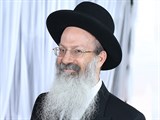Beit Midrash
- Sections
- Chassidish Stories and Great Rabbis
- Chassidish Stories
The Torah study is dedicatedin the memory of
Yaakov Ben Behora
General Govin was very old. He had served in the army for some fifty years. It once happened that military exercises were being carried out in the presence of the Czar Nikolai, in the vicinity of the city of Kobrin, and General Govin was the commanding officer of the company. Nikolai rode his horse the length of the first row of soldiers and then turned to the general, saying, "Greetings to you Govin. You are beginning to get old. Is your blood still ablaze?"
"Your Royal Highness," the old general responded, "It is not the blood that blazes, but the service."
At the foundation of the above story rests a similarity which exists between the "Kingdom of Earth" and the "Kingdom of Heaven." Rabbi Moshe MiKobrin made a practice of relating this story because he wished to take the existing dialogue and use it as a source for learning the proper manner of worshipping the Creator.

Chassidish Stories (17)
Rabbi Eliezer Melamed
1 - Menachem Mendel of Vitebsk: The Pioneering Rebbe
2 - The Service that Blazes
3 - A Tailor’s Task
Load More
This approach is quite typical of the Hassidic philosophy which holds by the rule that "there is no place wherein God is absent." Every aspect of creation, says Hassidism, serves as a revelation of God’s providence on earth. God’s "Kingdom on Earth" is in fact a reflection of the "Kingdom of Heaven." By observing and studying the ways in which God runs the physical world below it is possible to learn something about God’s reign above.
The position of kings in general, and more specifically the role of the Czar, became an important symbol in the eyes of Hassidism. It represented an unwavering dedication in the divine service of the Creator. The relationship between the Czar Nikolai and General Govin in our story is very special: On the one hand, it is clear who is the general and who is the Czar. The Czar rides a horse while the general stands at the head of the company. At the same time, great affection is displayed by the Czar for the general who has served his king for fifty years with great self-sacrifice and in the face of personal danger.
The subject of their discussion is old age, or, more specifically, aging in military service. The spiritual context into which Rabbi Moshe of Kobrin places this story is that of aging in the service of God, and the spiritual weakness which comes with prolonged service. Aging is not just the result of the passing of time; it also comes from the wear of routine, exhaustion and natural laziness.
The Baal Shem Tov used to explain that this is the significance of the familiar supplication, "Do not toss us into old age." He would say that this is a request to God that He not place us at the mercy of "old age" (i.e., monotonous routine and deterioration) with regard to our ability to serve God.
The number fifty mentioned in relation to the length of Govin’s military career is also significant from a spiritual standpoint. Regarding the service of the Levites in the Holy Temple it is written, "This is the rule regarding the Levites: Beginning at the age of twenty-five, they shall participate in the army workforce engaged in the Communion Tent’s service. Then, when they are fifty years old, they shall retire from the army workforce and not serve any more" (Numbers 8:24).
The Torah refers to the work of the Levites as "army work." The army workforce needs people who are between the ages of twenty-five and fifty. Above the age of fifty the soldier’s blood cools and he retires from the army work force and serves no more. The greatness of Govin in our story is that even after fifty years of serving his king he still possesses the vitality which ordinarily characterizes the youth who run off to battle eagerly. Therefore Czar Nikolai asks him, "Is your blood still ablaze?" Govin’s response is, "It is not the blood that blazes but the service." People have a tendency to assume that a person who possesses a fiery spirit infuses his divine service with his own personal heat. Govin, though, teaches us a very important lesson. Each of us is called upon to extract such heat from the service itself. The flame of action, the blaze of construction, the fire of regeneration in one’s divine service - these elements provide a person with the gift of youth, the gift of inner fire. We must extract spiritual strength from our service of God. It is this strength which will give us the capacity and vigor to continue serving our King with ever more vitality - in times of maturation and aging when monotonous routine causes erosion.
Furthermore, it is the service itself which blazes. The service which general Govin refers to is war service. Entering military service, facing fire and battle, these things indeed radiate intense heat upon a person. A person who faces perpetual trial and refuses to fall, such a person absorbs the heat of the battle and this provides him with personal fervor and energy. One who enters into the service of God via coping with the difficulties of such service will eventually find himself drawing strength from the flame of the battle, strength which will radiate warmth upon him in his service of God even in times when aging and erosion arrive.
-----------------------
Biblical passages in the above article were taken from or based upon Rabbi Aryeh Kaplan’s Living Torah (Moznayim).

Descending from the Hilltop
Rabbi Aryeh Hendler | 5764

“Who Shall Ascend the Mountain of the Lord?”
Rabbi Aryeh Hendler | 5766

The Dance of Sanctity
Rabbi Aryeh Hendler | 5766




















